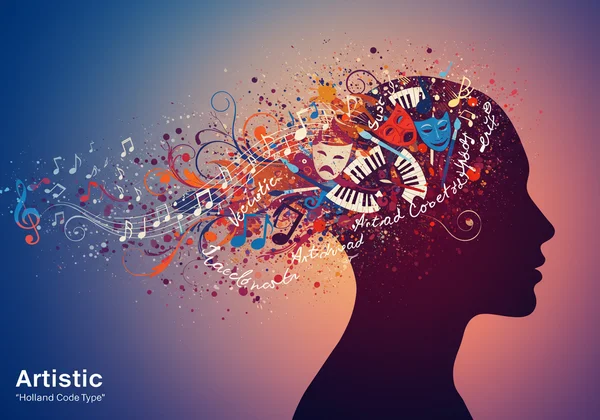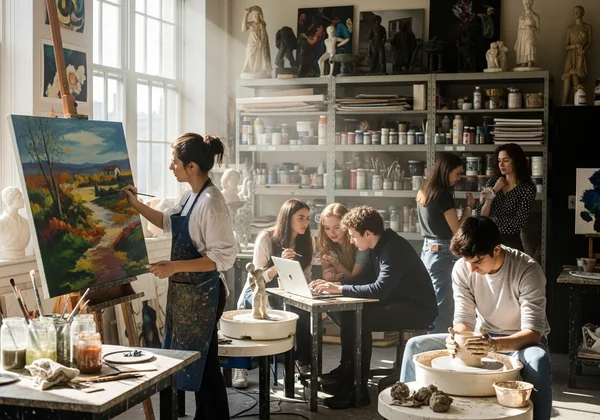Artistic Type Careers: A RIASEC Test Guide for Holland Code A
August 17, 2025 | By Samuel Chen
Are you naturally drawn to expression, originality, and unstructured environments? Have you ever felt that a traditional career path just isn't for you? If you find joy in creating, imagining, and innovating, you may resonate strongly with the Artistic type, one of the six categories in the renowned Holland Code framework. Understanding your place within this model can transform your unique passions into a clear and fulfilling career direction. This guide is dedicated to exploring Artistic type careers and helping you see how your creative spirit is one of your greatest professional assets.
The RIASEC model, developed by psychologist John L. Holland, is a trusted system for aligning personal interests with career choices. It’s not about putting you in a box; it’s about giving you a map. By identifying your dominant interest areas, you can find work that feels less like a job and more like a calling. If you're ready to see where your creativity can take you, the first step is to discover your Holland Code and unlock a personalized path to professional satisfaction.
What Defines the RIASEC Artistic (A) Type?
The Artistic (A) type, often referred to as "The Creator," is characterized by a deep need for self-expression. These individuals are the poets, designers, musicians, and innovators of the world. They are driven by their imagination and thrive when they can bring new ideas into existence. Unlike highly structured personality types, Artistic individuals prefer ambiguity, freedom, and the chance to work on their own terms. They see the world through a lens of emotion and aesthetics, finding meaning in beauty and originality.

Core Traits of an Artistic Personality
Do you recognize yourself in these descriptions? The artistic personality is a fascinating blend of sensitivity and independence. Key traits often include:
- Imaginative and Expressive: You have a rich inner world and enjoy communicating your ideas and feelings through various mediums, be it words, visuals, or performance.
- Independent and Non-conforming: You value freedom and autonomy. You dislike rigid rules and prefer to carve your own path rather than follow a conventional one.
- Intuitive and Idealistic: You often rely on your gut feelings and are driven by your ideals and values. You are passionate about the projects you believe in.
- Emotional and Sensitive: You are in tune with your emotions and the emotions of others, which fuels your creative work and allows you to connect with audiences on a deeper level.
Understanding these traits is the first step toward finding a career that honors your true nature. A comprehensive career interest test can provide a detailed profile of your unique strengths.
Your Ideal Work Environment
For an Artistic type, the right work environment is crucial for happiness and productivity. You flourish in settings that are unstructured, flexible, and aesthetically pleasing. A sterile, corporate cubicle is often draining for a Creator. Instead, look for workplaces that encourage originality and provide the freedom to manage your own projects and schedule. Studios, theaters, design firms, and freelance settings are often perfect fits. The key is finding a space where your imagination is seen as an asset, not a distraction.
Common Values and Motivations
What truly drives an Artistic type? At their core, their motivations are centered around self-expression and making an impact through their creative work. They are not typically motivated by money or status alone, although they appreciate being recognized for their unique talents. Their primary values include:
- Creativity: The ability to generate new ideas and create original work.
- Aesthetics: A deep appreciation for beauty, art, and design in all its forms.
- Originality: The desire to produce something that is uniquely their own.
- Freedom: The autonomy to work without strict constraints or micromanagement.
When your work aligns with these core values, you are far more likely to feel engaged and fulfilled. If you're a student choosing a major or a professional considering a change, aligning your path with these values is essential. You can start your test now to see how your values match with potential careers.
Top Artistic Type Careers for Creative Minds
Now for the exciting part: turning your artistic interests into a tangible career. The world of artistic personality jobs is vast and varied, extending far beyond the stereotypical "starving artist." Below are some promising career paths categorized by the type of creative expression they involve.

Careers in Visual Arts & Design
If you think in images and colors, a career in visual arts might be your calling. These roles combine technical skill with creative vision.
- Graphic Designer: Creates visual concepts using computer software or by hand to communicate ideas that inspire, inform, or captivate consumers. They are essential in marketing, publishing, and digital media.
- Photographer: Captures and edits images to tell a story or document an event. They may specialize in portraits, fashion, journalism, or fine art.
- Animator: Brings characters and stories to life for films, television shows, video games, and websites. This field requires both artistic talent and technical proficiency.
- Interior Designer: Designs functional and beautiful indoor spaces for homes, offices, and commercial buildings, combining aesthetics with practical considerations.
Careers in Performance & Music
For those who come alive in front of an audience, a career in the performing arts allows you to use your body and voice as your instrument.
- Musician: Composes, arranges, and performs music. This can range from being a solo artist or part of a band to playing in an orchestra or teaching music.
- Actor/Actress: Interprets characters and tells stories on stage, in film, or on television. This requires empathy, emotional range, and dedication to the craft.
- Dancer/Choreographer: Expresses ideas and emotions through movement. Dancers perform, while choreographers create and arrange the dance routines.
- Broadcast Presenter: Engages audiences on radio or television, requiring a charismatic presence and excellent communication skills.
Careers in Writing & Communication
If words are your preferred medium, there are numerous careers where your linguistic talents can shine. These roles are built on the power of storytelling.
- Author/Writer: Creates written content, including novels, non-fiction books, scripts, or articles. Many writers work freelance, giving them the autonomy Artistic types crave.
- Journalist: Researches, writes, and reports news stories for newspapers, magazines, websites, or broadcast media. It combines curiosity with compelling storytelling.
- Copywriter: Writes persuasive text (copy) for advertising and marketing materials. This role is perfect for creatives who enjoy using language to influence and engage.
- Editor: Reviews and refines written content to ensure clarity, accuracy, and style. Editors have a keen eye for detail and a deep love for language.
Matching College Majors for the Holland Code Artistic Type
For students, choosing a major is one of the most significant decisions you'll make. A major aligned with your Holland code artistic interests will not only be more enjoyable but will also set you up for career success. It's about building a foundation of knowledge and skills that will support your creative ambitions.

Fine Arts & Design Programs
These programs are the most direct path to many artistic careers. They provide hands-on training and a deep dive into creative theory and practice.
- Bachelor of Fine Arts (BFA): A specialized degree in areas like Studio Art, Graphic Design, Photography, or Theatre Arts.
- Music Performance or Composition: Degrees focused on honing your musical talent and understanding music theory.
- Film and Media Studies: Programs that explore the art of filmmaking, from screenwriting to production.
Humanities and Liberal Arts Degrees
These degrees offer more flexibility and are excellent for developing critical thinking, communication, and creative problem-solving skills, which are valuable in any field.
- English or Creative Writing: Perfect for aspiring writers, editors, and journalists.
- Communications: A broad field that can lead to careers in public relations, marketing, and media.
- Art History: For those who love art and enjoy analyzing its meaning and context, potentially leading to careers in museums or galleries.
Finding the right educational path is a crucial step. An online riasec test can help you connect your interests to specific fields of study and future careers.
Your Next Step: Turn Artistic Vision into a Career
Your artistic ability to imagine, create, and express is a powerful professional asset. The RIASEC framework provides the clarity to channel that gift into a fulfilling career. Understanding your unique interests is the key, and the framework is not a set of rules but a tool for empowerment, providing you with the clarity to turn your artistic vision into a rewarding career.
You've explored the traits, values, and potential careers for the Artistic type. Do they resonate with you? Remember, you are likely a combination of two or three Holland types. Discovering your full three-letter code (e.g., ASI, AIE) will give you an even more nuanced and accurate picture of your ideal career. Ready to take the next step? Take our free RIASEC test today!** Get your instant results and start building a future that truly reflects who you are.
Frequently Asked Questions About the Artistic Type
What does the A in RIASEC mean?
The A in RIASEC stands for Artistic. This type describes individuals who are creative, expressive, imaginative, and non-conforming. They are "Creators" who thrive in unstructured environments where they can use their talents to produce original work, whether in writing, visual arts, music, or performance. They are driven by a need for self-expression and value beauty and originality.
What are some high-paying artistic personality jobs?
While some artistic fields are famously competitive, many artistic personality jobs offer excellent earning potential. High-paying roles often combine creative talent with technical or strategic skills. Examples include Art Director, UX/UI Designer (for tech), Senior Graphic Designer, Animator for major studios, and successful commercial photographers or authors. To see a personalized list, you can explore your profile after taking the test.
Can I be an Artistic type and still be good at math or science?
Absolutely! This is one of the most important things to understand about the Holland Code. Almost everyone is a combination of types. Your full Holland Code is three letters, so you could be an "AIE" (Artistic, Investigative, Enterprising) or an "ARI" (Artistic, Realistic, Investigative). This combination means you might be a perfect fit for a career like architecture (Artistic & Realistic) or data visualization (Artistic & Investigative). Taking the test is the best way to find your path and discover your unique blend of interests.